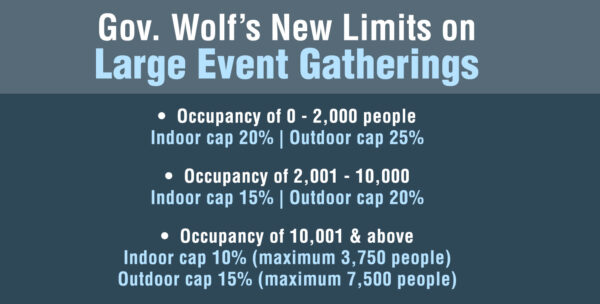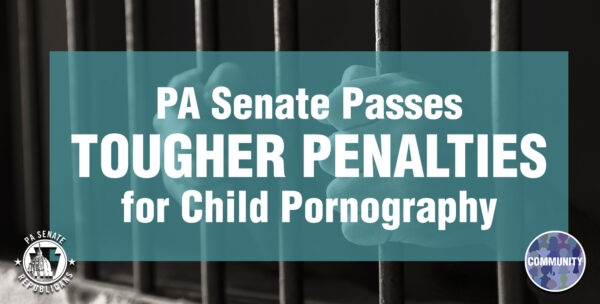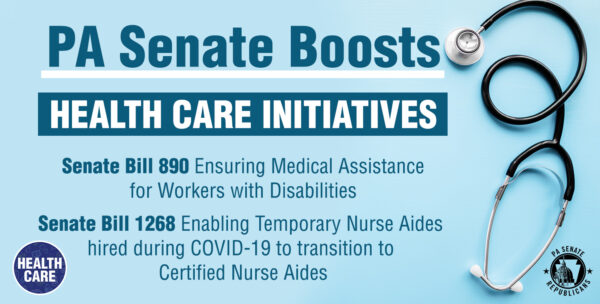
|
|
|
In This Update:
DiSanto Announces Virtual Wall of Honor Recognition for Area VeteransIn advance of Veterans Day 2020 on November 11, the veterans of the 15th State Senate District are invited to submit their names for inclusion on a Virtual Wall of Honor on my website. While I had hoped to hold my annual Veterans Appreciation Breakfast again this fall, because of COVID-19 mitigation recommendations and the resulting challenges with scheduling an indoor venue, an event of this size will not be able to be held. Instead, from October 26 through November 20, a page on my website will serve as a Virtual Wall of Honor and list all of the veterans who have submitted their information for recognition. Information can be submitted online at www.SenatorDiSanto.com. Veterans or their families may also contact my office at 717-787-6801 for a printed submission form. In addition to including veterans’ names on the Virtual Wall of Honor, special features and additional informational resources and opportunities for scheduling personal consultations about benefits and services for veterans will be found on my website. While I would have preferred to share fellowship in person, I am thankful that technology allows me to recognize our area veterans and thank them for their service and sacrifice. I look forward to resuming my Veterans Appreciation Breakfast next year. Veterans currently residing and deceased veterans whose last address was in the 15th Senatorial District are eligible for the Virtual Wall of Honor. Family members and friends are welcome to submit on behalf of deceased veterans so their service may also be recognized. Senate Approves DiSanto Bill to Better Protect NewbornsThis week the Senate unanimously approved my legislation, Senate Bill 983, to ensure children born in Pennsylvania are comprehensively screened for all recommended disorders so that newborns may receive prompt treatment and prevent instances of permanent disability or even death. Currently, the Department of Health administers the newborn screening program and maintains a short list of mandatory screenings and a longer list of optional ones whereby some hospitals choose to screen for the full panel while others do not. My constituent Lesa Brackbill of Hershey experienced firsthand how the health of newborns may be dependent on which hospital at which a baby is born after losing her young daughter, Tori, in 2016 when she was only 20 months old after a battle with Krabbe—a treatable disease when diagnosed at birth. The lack of a comprehensive screening mandate cost Tori her life, and Lesa has partnered with me on this bill to ensure health providers screen every child equally for every disorder recommended by the federal government and the Pennsylvania Newborn Screening and Technical Advisory Board. The legislation also empowers the advisory board to add any clinically recommended disorders for screening in the future without being subject to limitations in the Department of Health’s annual budget. Lesa has worked tirelessly over the past four years to improve Pennsylvania’s newborn screening program so that we may prevent similar tragedies from happening to other young families and newborns. No child should die or suffer when it’s possible to detect early and treat the disorder, and it’s my honor to join Lesa in protecting the lives of Pennsylvania’s newborns. The bill now advances to the House of Representatives for consideration. Update on Audit Details Glaring Inconsistencies in Governor’s Business Waiver System
At the request of state lawmakers and business owners throughout the state, the Pennsylvania Department of the Auditor General is taking a closer look at Governor Wolf’s deeply flawed waiver system that determined which businesses were forced to remain shuttered during the COVID-19 pandemic. Although the audit is still ongoing, a status update that was released by the Auditor General this week detailed glaring inconsistencies in the way the waiver system was handled. According to the Auditor General, “The waiver program appeared to be a subjective process built on shifting sands of changing guidance, which led to significant confusion among business owners.” The update also noted that the waiver system was “remarkably subjective,” and in many cases the approval or denial of applications depended heavily on the individual reviewing the application. Approximately 500 businesses received responses that were later reversed by the Department of Community and Economic Development, including 171 waiver applicants that were initially denied and forced to remain closed longer than necessary before finally receiving approval to reopen. I will provide further updates on this issue when the audit is completed. Expanded Indoor and Outdoor Gathering Limits Announced
A federal judge ruled last month that the Wolf Administration’s limits on gatherings were unconstitutional. However, a federal court ruled last week that the limitations should remain in place while the governor pursues an appeal. While these issues are resolved in court, the Wolf Administration updated its guidance on gatherings this week to allow for greater attendance at events that are held at larger venues. The new gathering limits are based on the occupancy limits of the venue.
The Wolf Administration’s new guidance still requires attendees to wear a mask and practice social distancing. The U.S. Centers for Disease Control and Prevention offers guidance to help event planners take the proper precautions to limit the spread of COVID-19. Senate leaders repeated concerns about Governor Wolf’s go-it-alone approach to most aspects of the state’s response to the pandemic and called for greater clarity and local decision-making power for schools and communities who are best positioned to protect their students and neighbors. Legislation to Crack Down on Child Pornography Earns Senate Approval
Legislation was approved in the Senate this week to strengthen penalties for the heinous crime of child pornography and create a new task force to help prevent children from being victimized in the future. The legislation would boost penalties in all cases of child pornography in which the child is under the age of 10 or prepubescent. In addition, the bill would create a special Task Force on Child Pornography to review all laws pertaining to child pornography and make recommendations to improve the investigation and prosecution of offenders to ensure the perpetrators of these crimes are held accountable for the tremendous damages they cause. Senate Passes Comprehensive Information Technology Overhaul
Information technology (IT) plays a critical role in the operations of all state agencies, and inadequate IT systems in state government can impact citizens in a variety of ways. The Senate approved legislation this week that would strengthen, secure and consolidate state government IT systems while saving taxpayer dollars. The legislation would seek to correct issues like the 1950s computer programming language still utilized by the Department of Labor and Industry, the vulnerability of state IT systems to cyberattacks and data breaches, and the lack of a strategic plan for future updates to keep pace with the demands of Pennsylvanians. The bill is estimated to save taxpayers as much as $32 million annually. Committee Examines Bill to Give Students New Resources to Succeed
As Pennsylvania continues to navigate the challenges posed by COVID-19, it has never been more important for students and families to have flexible education options for at-home learning. The Senate Education Committee held a public hearing this week to take a closer look at legislation that would ensure children in Pennsylvania will have access to the educational resources they need to succeed. The committee heard testimony from education experts and advocates throughout Pennsylvania about a proposal to create Back on Track Education Scholarship Accounts to empower parents by providing funding to offset educational costs for their school-age children in grades K-12. The special accounts would help families pay for educational needs such as tutoring, online classes, curriculum, tuition, counseling, and services for students with special needs. Key Health Care Bills Move Forward in the Senate
The Senate approved two bills this week to protect access to health care coverage and services in Pennsylvania communities. The bills would ensure employees with disabilities can continue to work without the risk of losing access to health care benefits and allow temporary nurse aides hired during the COVID-19 emergency declaration to receive certification to continue working. |
|
|
|



2024 © Senate of Pennsylvania | https://www.senatordisanto.com | Privacy Policy |





